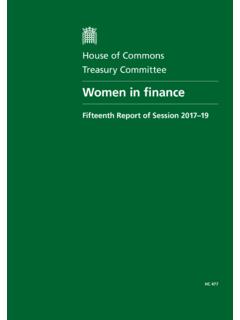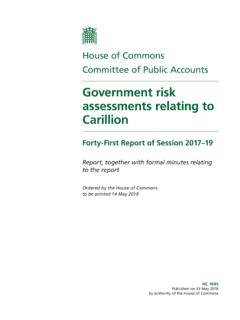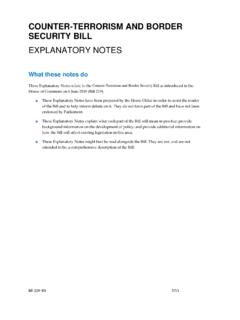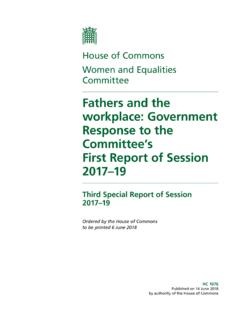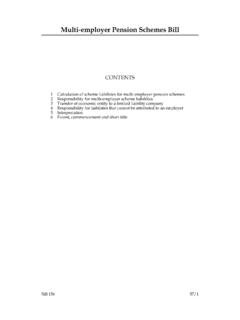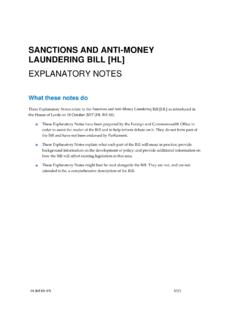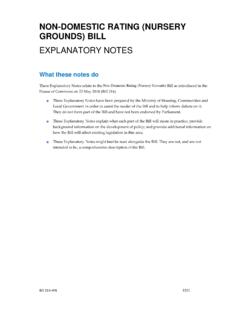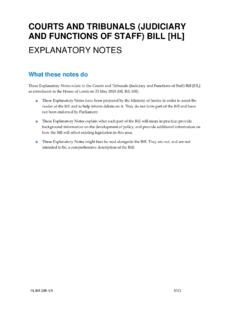Transcription of After Carillion: Public sector outsourcing and contracting
1 House of CommonsPublic administration and constitutional affairs CommitteeAfter Carillion: Public sector outsourcing and contractingSeventh Report of Session 2017 19 Report, together with formal minutes relating to the reportOrdered by the House of Commons to be printed 3 July 2018HC 748 Published on 9 July 2018by authority of the House of CommonsPublic administration and constitutional AffairsThe Public administration and constitutional affairs Committee is appointed by the House of Commons to examine the reports of the Parliamentary Commissioner for administration and the Health Service Commissioner for England, which are laid before this House, and matters in connection therewith; to consider matters relating to the quality and standards of administration provided by civil service departments, and other matters relating to the civil service; and to consider constitutional membershipSir Bernard Jenkin MP (Conservative, Harwich and North Essex) (Chair)Ronnie Cowan MP (Scottish National Party, Inverclyde)Paul Flynn MP (Labour, Newport West)Mr Marcus Fysh MP (Conservative, Yeovil)Dame Cheryl Gillan MP (Conservative, Chesham and Amersham)Kelvin Hopkins MP (Independent, Luton North)Dr Rupa Huq MP (Labour, Ealing Central and Acton)Mr David Jones MP (Conservative, Clwyd West)Sandy Martin MP (Labour, Ipswich)David Morris MP (Conservative, Morecambe and Lunesdale)Tulip Siddiq MP (Labour, Hampstead and Kilburn)PowersThe committee is a select committee, the powers of which are set out in House of Commons Standing Orders, principally in SO No 146.
2 These are available on the internet via reports are published on the Committee s website at and in print by Order of the relating to this report is published on the inquiry publications page of the Committee s staffThe current staff of the Committee are Libby Kurien (Clerk), Sarah Thatcher (Clerk), Ian Bradshaw (Second Clerk), Dr Patrick Thomas (Committee Specialist), Dr Philip Larkin (Committee Specialist), Makka Habre (Committee Specialist), Dr Henry Midgley (Committee Specialist), Gabrielle Hill (Senior Committee Assistant), Iwona Hankin (Committee Assistant), and Mr Alex Paterson (Media Officer).ContactsAll correspondence should be addressed to the Clerk of the Public administration and constitutional affairs Committee, House of Commons, London SW1A 0AA. The telephone number for general enquiries is 020 7219 3268; the Committee s email address is After Carillion: Public sector outsourcing and contracting ContentsSummary 31 Introduction and context of our report 62 How appropriate is it for Public services or projects to be run by the private sector ?
3 8 The significance of outsourcing 8 The case for outsourcing 10 The Decision to outsource 12 Evidence Base 143 The Private Finance Initiative: time for honesty 164 The Government s approach to contracting : managing risk 20 The Government s power as a purchaser 20 The Government s approach to contracting 21 Risk Transfer 21 Pricing of Public sector contracts 24 Renegotiating contracts 265 The effect of Government monopsony on the private sector 28 The health of private sector contractors 28 Competition and contestability 31 Instability in Large Contractors and the case of Carillion 336 The Capability of the UK civil service 37 Commercial capability 37 Information, Transparency and Accountability 40 Conclusions and recommendations 43 Formal minutes 50 Witnesses 51 Published written evidence 52 List of Reports from the Committee during the current Parliament 533 After Carillion.
4 Public sector outsourcing and contracting SummaryGovernment outsourcing and contracting has become a very significant part of the delivery of central and local government services throughout the world. The UK Government spends billion per year on outsourcing and contracting . The UK spends of GDP on Public procurement, which is not significantly different from countries such as Denmark ( ) or Germany ( ). Despite the UK leading innovation in this field for some 30 40 years, there has been a depressing inability of central government to learn from repeated mistakes and to some extent the collapse of Carillion and the state of the sector reflect failure of Carillion was one of the biggest commercial challenges the Cabinet Office has ever faced. The Government was right not to bail out Carillion. The Government was prepared for the consequences of this decision, and was able to ensure that Public services kept operating as far as possible.
5 However, the failure of Carillion reflects long term failures of Government understanding about the design, letting and management of contracts and his recent speech, the Minister for the Cabinet office, Rt Hon David Lidington MP, underlined the importance of rebuilding Public trust between government, private sector providers and the Public . Carillion s failure reinforced a widespread crisis of confidence in government reliance on the private sector to deliver Public projects and services on which the Public relies. The Government needs to move quickly to improve Public confidence in the competence of its commercial is unclear how and why the Government decides whether to outsource a particular service. The Government has a process, set out by the Treasury, to make decisions about how it should deliver services and run projects, including evaluating options about whether and how to use the private sector .
6 However, the Government does not always follow its own process. Moreover, the evidence used to support these decisions is thin or non-existent. This report calls for the Government to follow its own processes to decide whether and how to make or buy , before any Public contract is put out to tender, and to publish the justification (including its evidence) on which the decision is based. This transparency is vital for rebuilding Public report finds that government ineffectiveness has contributed to the problems that Carillion and other companies have faced. The Government has deliberately promoted an aggressive approach to risk transfer to the private sector - often even attempting to transfer risks that the government itself has completely failed to analyse or to understand. Government assumed Carillion had accurately estimated its own costs in delivering maintenance for the prison estate, even though it later transpired the accurate cost was 15 million more.
7 Government procurement has been driven by price while failing to appreciate differences in quality that contractors may be offering. We recommend a fundamental change of attitude by the Government towards its partners - ensuring that risk transfer is realistic and that quality, an appreciation of systemic risk and economic impact as well as price drives decision making. The Cabinet Office should also aggregate the risk exposure from across the whole of government to large contractors like Serco and Capita, so there is a better appreciation of how much the Public sector as a whole is relying on individual companies. After Carillion: Public sector outsourcing and contracting 4 Government failures in this area have forced government repeatedly to renegotiate contracts with the private sector . Even in the months since the beginning of 2016, departments have already had to renegotiate over 120 million worth of contracts with the private sector .
8 This reflects poorly on government s effective ability to let and manage Government s pressure on private sector partners has encouraged reckless acquisitions and efforts to achieve unsustainable growth. In some markets, diminishing competition and high barriers to entry for new suppliers means there are too few bidders, so the market looks more like an oligopoly. Despite their market domination, many of the major players have had to announce dividend cuts and recapitalisations to address over optimism and tighter margins from government contracts. The Government must also take steps to improve competition and encourage more suppliers into these Government must re-examine its due diligence procedures and learn from the Carillion crisis. The Government must develop a deeper understanding of its commercial partners supply chains and of the risks hidden behind their published accounts and Public statements.
9 Share prices, buy, hold or sell recommendations, and Public statements are a poor guide to the long term security of these companies. Shareholders can accept higher risks for an equity rate of return and can bale out at short notice. The Government is in for the long term and cannot take such risks with Public money or with the security of Public services. The Government must better understand the security of their cash flows and the real value of their balance sheets and potential liabilities. Carillion s balance sheet was fatally weakened by high risk construction contracts. It was also puffed up with high valuations of goodwill, reflecting no more than how much it had overpaid for acquisitions and which provided no security. The Government needs to understand better the true quality of leadership and governance of its major commercial partners, whose greed and appetite for risk in Carillion was significantly at odds with Public service Government has been improving its commercial capability but this must not simply be about beating down prices.
10 The Government must improve its skills in the negotiation and management of contracts, so that it best employs the strengths of the private sector while also understanding its limitations and weaknesses. These commercial skills cannot be seen in isolation either but must be integrated with other skills such as costing, project management, IT capability and financial planning, along with deep and relevant subject knowledge and Government admits that its data about contracts internally is poor: we have commented again and again about the lack of useful internal data in Government, which can lead to blind reliance on what companies tell the government, instead of a genuine exchange of information and a continual appraisal of the contractor s performance over the lifetime of the contract. This also depends upon developing a professional atmosphere of verified trust and collaboration between the people in government departments and in private contractors, based on the values attitudes and behaviour which the Public expects to be demonstrated in the delivery of Public After Carillion: Public sector outsourcing and contracting contracting and outsourcing with the private sector is a permanent feature of governments in mature economies across the world and it will remain so, whichever government is in power.

